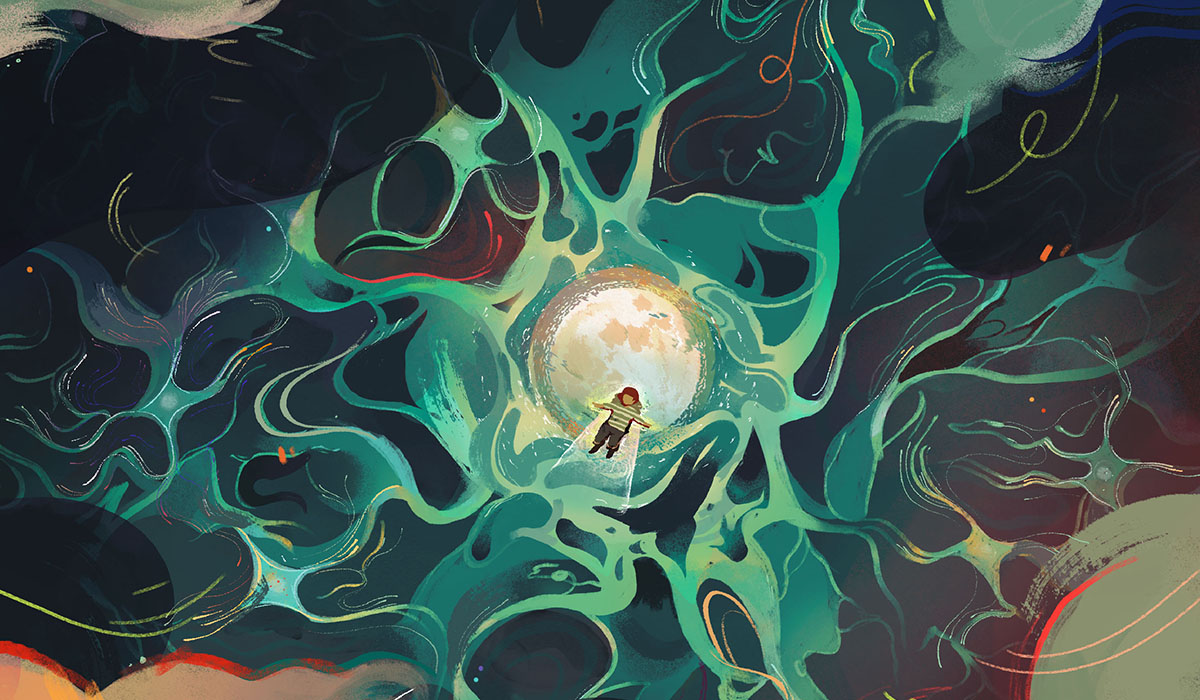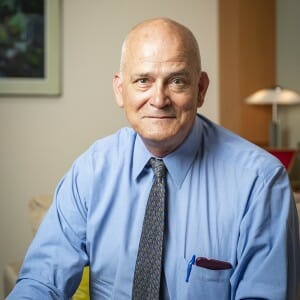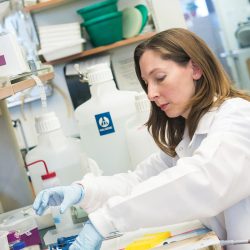
Psychedelic Wonder Drugs
UW–Madison leads the way in a potentially transformative field of medicine.
“I’ve never used the stuff,” Paul Hutson makes a point to say.
There’s a tinge of distaste in the pharmacy professor’s voice, an ambivalence that would normally seem out of place for someone who believes his research will rise to the gold standard of medicine. “It is going to save lives, quite honestly,” he says.
But the stuff is psychedelics. And almost everything about psychedelics — from the effects on the brain, to the cultural history, to the therapeutic potential — is complicated.
In a state with little prospect of legalizing even marijuana for medical use, UW–Madison is an unlikely leader in the study of psychedelic drugs. Researchers are conducting a series of human trials to analyze the use of psilocybin, the psychoactive ingredient in magic mushrooms, to treat depression and addiction. They’re also studying MDMA, a club drug known as Ecstasy or Molly, as a boost to psychotherapy for post-traumatic stress disorder (PTSD).

Psychedelics research “is going to save lives, quite honestly,” says UW pharmacy professor Paul Hutson.
The early results, in Madison and elsewhere, are staggering. And the potential for addressing a mental health crisis is putting pressure on federal agencies to reconsider the Schedule 1 status of these psychedelics, which defines them as having “no currently accepted medical use and a high potential for abuse.” The designation chilled research on the compounds for decades.
Hutson is hardly a wild-eyed radical. Balding and clean-shaven, with a preference for a shirt and tie, he could pass for a CEO rather than a psychedelics scientist. He’d spent much of his three-decade career studying chemotherapy drugs and traditional palliative medicine before he became involved in this new wave of psychedelics research.
Serious scientists like Hutson are proving to be the perfect antidote to the cultural stigma left behind by past scholars-turned-prophets in the 1950s and ’60s. Most zealous among them was Harvard professor Timothy Leary, who, entranced by the humanistic potential of LSD, encouraged a young generation to “turn on, tune in, drop out.” Riding a cultural backlash, Congress passed the Controlled Substances Act in 1971 and effectively put an end to the 1,000 or so studies that had been conducted on psychedelics.
Half a century later, the UW’s research team is forging ahead. This fall, the School of Pharmacy is starting classes for its first-of-a-kind master’s program in psychoactive pharmaceutical investigation. Over the summer, the UW launched the Transdisciplinary Center for Research in Psychoactive Substances, with more than a dozen affiliated faculty members across the humanities and the sciences.
The researchers are reluctant to speculate about the potentially transformative application of these drugs and eager to underscore the many unknowns left to answer. They seem intent on avoiding a repeat of history, and with the benefit of modern scientific protocols and rigor, they’re likely to succeed.
“We feel that, frankly, our data are airtight,” Hutson says.
And if you’re a skeptic, their data may well turn you into a believer.
New Shifts in Perspective
After doctors told Erin, a 51-year-old woman with ovarian cancer, that she had a 50–50 chance of surviving five years, the prognosis paralyzed her. “You realize you’re going to die,” she said.
With little to lose, she enrolled in a psilocybin study at New York University on cancer-related distress. During her psychedelic experience, she came face-to-face with her diagnosis — as a guest at an imagined dinner table.
“The feeling I had was cancer is part of everything … as opposed to something [negative] I had to separate out,” she told researchers in a study published in the Journal of Humanistic Psychology in 2017. With a newfound “acceptance of the human experience,” she could move forward in life.

After just one or two doses of psilocybin, some participants with depression or addiction have reported a reduction in symptoms for as long as a year.
When psilocybin breaks down in the body, it binds to serotonin receptors in the brain. The primary receptor that produces psychedelic phenomena is 5-HT2A. In a compromised state, it alters how the mind processes multisensory information such as images, thoughts, feelings, and memories.
“It essentially allows people to have more flexible access to aspects of their mind that they wouldn’t have in an ordinary state of consciousness,” says Christopher Nicholas, a clinical psychologist and assistant professor in the UW’s School of Medicine and Public Health. “It can lead to new shifts in perspective on themselves and the world around them.”
UW researchers are conducting a series of human trials to analyze the use of psilocybin, the psychoactive ingredient in magic mushrooms, to treat depression and addiction.
Every psychedelic experience is unique, but several themes emerge. On a surface level, there are strange visual stimuli — the trippy hallucinations and gaudy colors. On a deeper level, there’s often a dissolution of one’s sense of self and a gained perspective of being part of something more universal. This dreamlike experience can lead to fundamental insights that are difficult to translate into words.
“People will say something like, ‘I realize the universe is love,’ ” says Charles Raison, an internationally recognized psychiatrist and professor at the UW School of Human Ecology. “Well, that would never make it on a Hallmark greeting card, but they say, ‘No, you don’t understand. I actually experienced it.’ ”
The most reflective journeys, as measured by postsession questionnaires, can rise to the classification of a “mystical experience.” There’s mounting evidence to suggest that the higher a patient scores on this measure, the better the therapeutic outcome.
But those outcomes don’t happen in isolation.
Safety First
In the psychedelics research space, “set and setting” is the dominant maxim. A patient’s mindset and the physical surroundings are critical predictors for a positive experience — or a way to avoid a bad trip, in more casual terms. Every psilocybin trial is designed accordingly.
Across all modern trials, there have been no reports of serious side effects such as psychosis or self-inflicted harm. Volunteers go through intensive psychological and medical screening for signs of high-risk indicators. To even conduct a study with a Schedule 1 drug, researchers must navigate a months-long bureaucratic maze, applying for an investigational new drug exemption from the U.S. Food and Drug Administration (FDA), securing a series of approvals from an institutional review board on scientific integrity, and receiving authorization from the state’s controlled-substances board. The FDA and the Drug Enforcement Administration provide final sign-off.
UW researchers developed an intensive set of protocols during their first study published in 2017, testing the safety of escalating psilocybin doses in healthy adults. An important step was creating a comfortable treatment space in the School of Pharmacy. If you ignore a scattering of medical devices, you could mistake it for the living room of a free-spirited friend, with plush seating, soft lighting, and nature-oriented art.
In the UW’s studies, participants receive six to eight hours of counseling in advance of the dosing to address expectations and familiarize them with the setting. When they receive the dose, they’re encouraged to wear eye shades, put on headphones with instrumental music, and focus inward. Two trained facilitators, or “guides,” with licensed mental health backgrounds are present to support the patient through the experience, which can run the gamut of human emotion. One participant described “being alone on a raft in the middle of an ocean on a starless night,” Hutson recalls.
“We provide a lot of reassurance that they are safe, that they are not alone, allowing them to trust the experience and to be open and curious about whatever comes up,” says Nicholas, who served as a guide on the UW’s initial study before becoming a principal investigator. “Sometimes we’ll say, ‘Go in and through’ if they face challenging content, because they often have an experience of resolution.”
After the subjective effects subside, participants are taken to UW Hospital for an overnight stay. Later, they have “integration” sessions to work through their experience and internalize new insights.
“It’s not just psilocybin leading to positive therapeutic outcomes,” Nicholas says. “It’s really the full package of treatment.”
And those positive therapeutic outcomes are starting to shake up the field of psychiatry.
“We’re Stuck”
Last year, UW researchers published a meta-analysis of four recent studies on psilocybin to treat anxiety and depression. In studies comparing psilocybin to a placebo, they found a difference in symptom reduction that was nearly identical to that of traditional psychological interventions versus no treatment.
In April, researchers at Imperial College in London released findings from the first trial comparing psilocybin to a traditional antidepressant. Fifty-nine participants with depression were randomly split into two groups. One received high doses of psilocybin three weeks apart, plus a daily placebo drug for six weeks. The other received two trivial doses of psilocybin, plus a daily antidepressant. By the study’s primary measure, a 16-point questionnaire on depression symptoms, there was no statistically significant difference in outcome between those given psilocybin and those given the antidepressant. However, across four measures of symptoms, 70 percent of those in the psilocybin group responded to the therapy, compared to just 33 percent in the antidepressant group.
The UW is part of a national Phase 2 trial — sponsored by the private, nonprofit Usona Institute in Fitchburg, Wisconsin — to study the effectiveness of psilocybin for people diagnosed with major depressive disorder. The trial is measuring the outcomes of a single dose of psilocybin compared to niacin, an active placebo, after six weeks. The results will be the first to compare a psychedelic to a placebo in a population with the same medical diagnosis.
UW researchers are also beginning trials on opioid and methamphetamine use disorders, which will be the first to measure psilocybin’s effects on those addictions.
Raison refers to the past 30 years as a “wasteland” for discovering novel treatments for depression, as rates of diagnosis and treatment-resistant cases have steadily climbed. One in 13 adults in the U.S. experiences a major depressive episode annually, according to the 2019 National Survey on Drug Use and Health, with the highest rates among those ages 18 to 25.
“Current antidepressants have basically done all they can do. We’re stuck,” Raison says. “Increasingly, regular antidepressants are seen as just symptom masters. We know that they don’t solve the problem. And in fact, there are disturbing data suggesting that the long-term use of antidepressants may, in some people, make their depressive course worse.
“We need to do more than just suppress symptoms — we need to begin to find ways to get at the underlying causes. And I think there is a feeling that psychedelics may get closer to that goal.”
Beyond the Trip
The prevailing theory for why psilocybin may be effective against depression centers on the brain’s default mode network. This interconnected system kicks into high gear when your mind is at relative rest. When you focus on a specific task, the network is fairly quiet; when your mind floats to a daydream or a trip down memory lane, it lights up.
Researchers hypothesize that people with depression may be suffering from a hyperactive default mode network — one that’s inducing the brain to overanalyze everything. Notably, psilocybin has been found to “reset” the network. In a state of depression or addiction, the mind is stuck in a rigid pattern; ideally, psilocybin reintroduces it to flexible thought and wedges open new pathways for neurons to communicate.
“It builds on an old idea that neurons that fire together, wire together,” says Cody Wenthur, an assistant professor of pharmacy and director of the UW’s new psychedelics master’s program.
Since the subjective effects of psilocybin dissipate within hours, the lasting change in patients remains something of a mystery. After just one or two doses, some participants with depression or addiction have reported a reduction in symptoms for as long as a year.
“Is it because they remember the insight that they had during this experience? Or is it some fundamental switch that was flipped biochemically in the brain?” Hutson asks. “We don’t know.”
To find out, UW researchers are asking a fundamental but provocative question: what if the trip itself doesn’t matter?
Over the summer, they launched a Phase 1 trial with the goal of separating the therapeutic outcomes of psilocybin’s pharmacological effects and the psychological experience. Along with a standard dose of psilocybin, they plan to give volunteers midazolam, a sedative that prevents the formation of memory while awake. The hope is for participants to go through a full psychedelic experience that they can’t remember, and then measure the antidepressive results. By comparing the outcomes to a baseline from past studies, they can isolate the effect of the conscious experience.
If they find that memory isn’t a key driver of the therapy, it could arguably upend the field. “From a pharmaceutical company point of view, the Holy Grail would be tweaking psychedelics to something you can patent with one pill that works for three months but can be taken at home because it doesn’t produce a psychedelic experience,” Raison says.
But he suspects that consciousness matters, and that the therapeutic benefit will involve a combination of pharmacological and psychological factors.
With a half dozen clinical trials on psilocybin in the works, the UW is also contributing to a late-stage study on MDMA. And the results suggest FDA approval could happen sooner than you think.
Unlikely Allies
In May, the Multidisciplinary Association for Psychedelic Studies published findings from a highly anticipated clinical trial on MDMA-assisted psychotherapy to treat PTSD. Coauthored by UW researchers in Nature Medicine, it reported that 67 percent of participants who received MDMA during three therapy sessions no longer qualified for a PTSD diagnosis after 18 weeks, compared to 32 percent who received a placebo with therapy. In the MDMA group, 88 percent of participants experienced a clinically meaningful reduction in symptoms.
The national Phase 3 trial treated 90 patients, and the UW was one of several sites selected to participate. A subsequent study is aiming to replicate the results in 100 more patients, which would likely clear the FDA’s threshold for approval.
MDMA is a derivative of amphetamine and has less of a hallucinogenic effect than psilocybin. It increases activity in several neurotransmitters and releases extra serotonin, oxytocin, and dopamine, which regulate mood and emotion in the brain.
Researchers speculate that the drug’s “pro-social” effect — expanding feelings of happiness, self-compassion, empathy, openness, and connection to others — can enhance psychotherapy for those suffering from PTSD. They refer to MDMA as a catalyst for mechanisms of therapy that have already proven to be effective: a trusting bond between patient and therapist, greater emotional awareness, and psychological flexibility. Importantly, it may allow patients to recall and process negative, fear-related memories without becoming overwhelmed.
“[The model] runs on the premise that we can unlock access to heal ourselves,” says Nicholas, who’s serving as a co–principal investigator of the Phase 3 study with Randall Brown PhD’09 of the School of Medicine and Public Health.
The research has attracted unlikely allies, including former Texas governor Rick Perry, a self-described “antidrug person.” The Republican recently lobbied the state’s legislature to pass a bill promoting clinical studies of MDMA and psilocybin to treat PTSD in military veterans.
“Properly done in the right type of clinical setting, [it] will save a multitude of lives,” Perry told the Texas Tribune in April. “I’m convinced of it.”
The Wisconsin Psychedelic Research and Education Fund offers the chance to help the search for new treatments. Support for research and discovery is a pillar of the UW’s All Ways Forward comprehensive campaign.
The Existential Question
Since 2018, the FDA has twice granted psilocybin a breakthrough therapy designation, including for the Usona Institute’s work with the UW. The process expedites the development and review of promising drugs. If larger studies verify that psilocybin is at least as effective as existing treatments, the agency could officially approve it as a therapeutic option. Experts speculate that it could happen as soon as 2025. For MDMA, granted breakthrough status even earlier, approval is expected by 2023.
If you follow the money, the secret’s already out. There are now dozens of psychedelic drug companies, some valued at more than $1 billion. But UW researchers warn that expectations may soon outpace the data.
“I don’t think that they’re going to turn out to be miracle cures,” Raison says.
Results in larger populations are likely to be less impressive. Study participants can usually tell whether they’ve received a placebo or the real thing, which could be inflating outcomes.
There are also the practical challenges. Psilocybin is an extremely cost- and resource-intensive therapy. Dosing sessions take around eight hours and require a team of health care professionals. It’s not clear how the treatment could be scaled in an affordable way, and psychedelics won’t be an appropriate treatment option for everyone.
"We need to do more than just suppress symptoms [for depression] — we need to begin to find ways to get at the underlying causes. And I think there is a feeling that psychedelics may get closer to that goal."
And then there’s the existential question that casts a long shadow over today’s research — the one that captivated the first generation of psychedelics researchers. If these drugs have the power to help cancer patients cope with death or a depressed patient find a new lease on life, what’s to say we all wouldn’t benefit from a mystical experience?
The UW’s research team is happy to leave that question to others.
“Maybe psychedelics could produce better societies, but opening people up to unusual experiences can cut both ways,” Raison says. “It can make them more superstitious, less willing to trust solid science.
“If we can help people with depression, we will help make the world a more tolerable place. The older I get, the more cautious I am about saving the world writ large. It’s hard to do.” •
Preston Schmitt ’14 is a staff writer for On Wisconsin.
Published in the Fall 2021 issue




Comments
No comments posted yet.